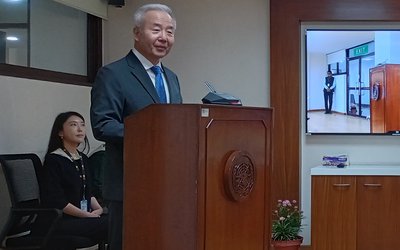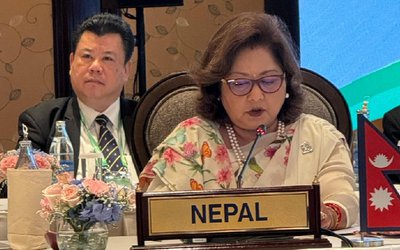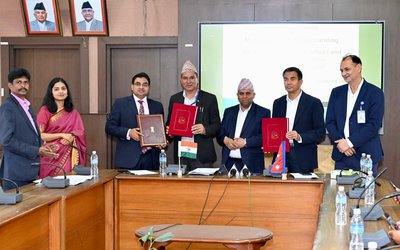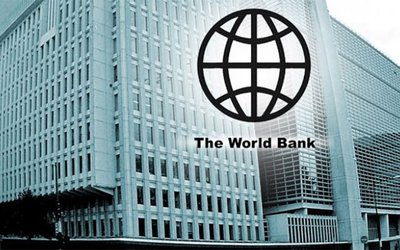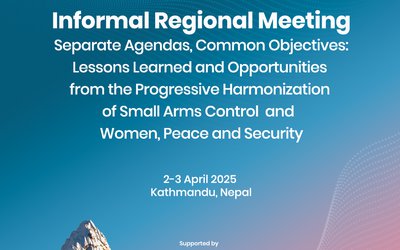
Sakhiva Khatun and Ram Pukar Das, two informal waste workers of Kathmandu, had nothing in deposit until two years ago. The income they made by collecting the waste and selling them to recycling centers was barely enough to feed their family members.
Living in temporary slums along the Bagmati River in Kathmandu and Lalitpur, informal waste workers like Das and Khatun, have seen tremendous change in their livelihood in the last two years. Thanks to continued support by PRISM project, informal waste workers can now see a tangible change in their day to day life. Their life is more secure now than two years ago in terms of health, finance and education.
As the project period is coming to a close next year after full three years of its tenure, the future of IWW is uncertain again. "We need this project at least for another few more years till the institutionalization of the system of waste workers like us," said Khatun, who makes a little over 3 US dollars a day. “The project has brought a lot of transformations in our life as well as the life of our children."
Khatun and Das are two members among over 5,000 IWWs, who have benefited from the project. “The project successfully turned IWWs from non-organized to organized and informal to formal," said Srijana Devkota Adhikari, Project Manager for Practical Action Nepal.
Under the social protection program, PRISM has several schemes to address the problems of IWW. Under the health care scheme, there is in an outpatient service in all three districts of the valley. Similarly, there are child protection schemes, early child hood programs and education programs. Women protection schemes establish community resource centers, skill development training and non-formal education programs. Similarly, the project also helps to establish waste workers. There is saving and credit mobilization scheme with facilities for loan and saving. There is an institution for preventive health care which provides first aid and safety method. The ID card is also distributed for Nepalese IWW. The cash transfer scheme provides loan and saving support system. Finally, there is also a safety net for IWW.
Although Kathmandu valley’s cleanliness depends on the informal waste workers, they are the most unwanted and neglected bunch of people. Despite working in hazardous areas of waste management, informal waste workers have no safety guarantee.
With the support from European Union, Practical Action has been launching Poverty Reduction of Informal Workers in Solid Waste Management (PRISM) Project with five other partners like Centre for Integrated Urban Development (CIUD), Solid Waste Management and Resource Management Centre (SWMRMC), UN-Habitat Water for Asian Cities Program Nepal, Nepal Reuse and Recyclable Goods Entrepreneurs Association (NRRGEA).
It is estimated that there are about 10,000 to 15,000 people in Katmandu Valley, working in the solid waste management sector. Informal waste workers (IWWs) belong to the poorest of Nepali society and are highly vulnerable to health problems because of their daily contact with hazardous substances.
By way of accessing a group, PRISM teaches an IWW about programs and activities such as microfinance. One of the main goals of the project is to increase the IWWs’ income by 30 per cent. But how will that be sustainable in the long term? “For example,one group of 35 IWWs has set up a business plan for a plastic tearing machine,” saidNabin Bikash Maharjan, of the Centre for Integrated Urban Development (CIUD), implementing partner for this project
Next year, the PRISM project will end. Nobody knows what will happen to all the achievements made in the three years. "There is the need to extend the project period for some more years because time is needed for institutions under the project to function effectively,” saidSarala Shrestha, social mobilizer. “There is enough money, but too little time. We have already worked non-stop on this for twenty months. It took us over a year only to identify 4,000 IWWs. Slowly but surely, we are seeing the results. We piloted this project but the municipalities need to make it sustainable,” she says
Urbanization in Nepal is increasing at an alarming rate with an increase from 3-17% in the last 5 decades. Due to lack of appropriate employment opportunities, a large number of workers in the informal economy are engaged in waste-related work.
In the Kathmandu Valley, it is estimated that there are 10-15,000 waste pickers and 700-800 Kabadis (waste/scrap dealers). Although these workers play a vital role in dealing with the wastes generated in the Valley, the profession is considered shameful and degrading, and its contribution is unrecognized by society as well as local and state authorities.
Waste workers are often exploited socially and economically. They find it hard to fight this exploitation due to a range of factors including their lack of bargaining power, illiteracy, lack of market information, and lack of skills and technology which could help them add value to the materials they collect and recycle. None of the current policies or plans includes social protection provisions which could help improve the situation, and raise the status of the profession.
Project Manager for Practical Action Nepal, Srijana Devkota Adhikari, agrees. "The project targets around 4,000 waste workers, all having an increase in health and safety, leading to better health outcomes, 2,000 having increased incomes, and 1,000 having access to affordable health care and insurance. We expect that at least 50% of beneficiaries will be women."
- IME GROUP: Expands Into Paper Industry
- Mar 24, 2025
- CPN UML: Instigated By India
- Mar 23, 2025
- ADB’S CHIEF ECONOMIST: Nepal Reduces Poverty
- Mar 11, 2025
- FM DR. DEUBA: A Successful Visit
- Mar 11, 2025
- MD GHISING: Target Of Personal Grudge
- Mar 09, 2025
